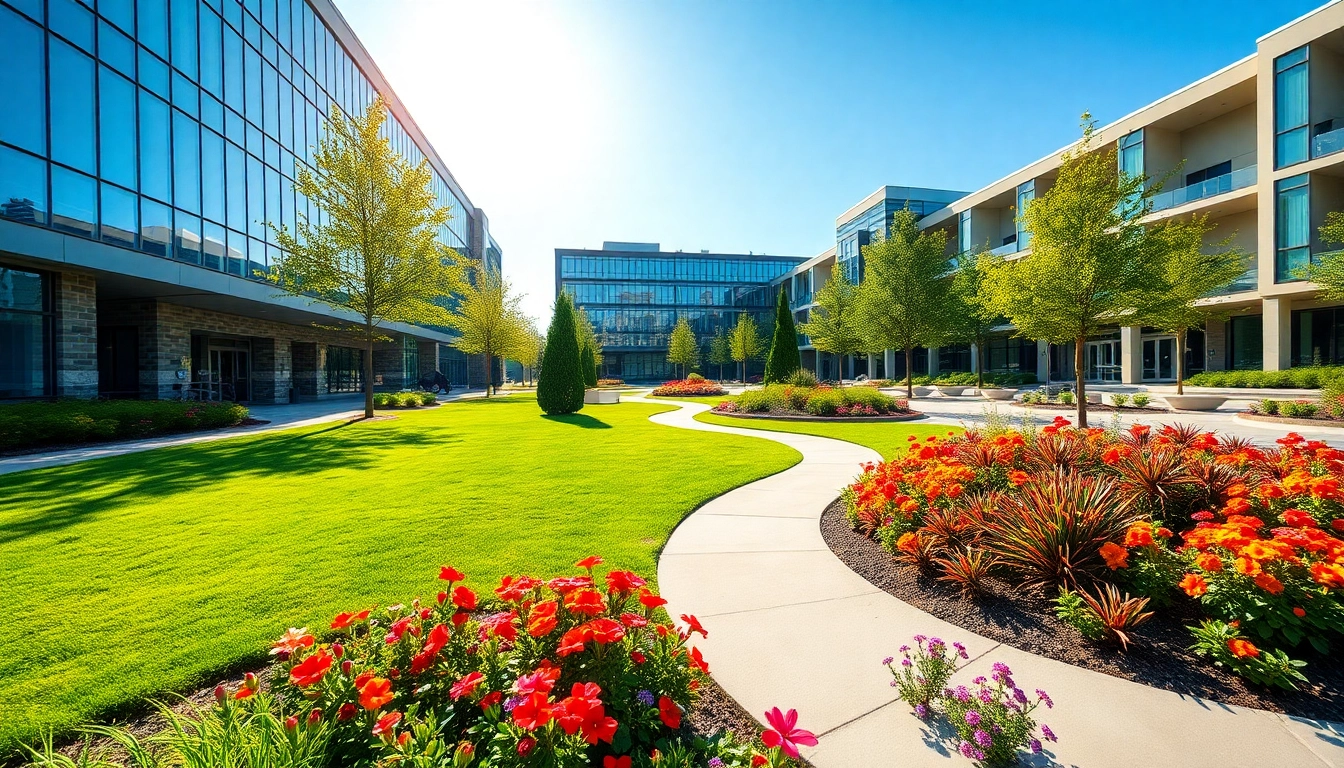Understanding Commercial Landscaping Services
Commercial landscaping is a vital aspect of property management that significantly impacts the overall aesthetics and functionality of commercial environments. With the rising emphasis on creating inviting outdoor spaces that cater to both employees and customers, businesses are turning to professional commercial landscaping contractors to transform their outdoor areas. This article delves into the ins and outs of commercial landscaping, offering insights into its importance, the various services provided, and how to choose the right contractor for your needs.
What Is Commercial Landscaping?
Commercial landscaping encompasses a wide range of services that are performed on business properties including retail centers, corporate offices, parks, and other public and private spaces. Unlike residential landscaping, which typically focuses on private homes, commercial landscaping emphasizes aesthetics, functionality, and sustainability in spaces used by businesses and the public.
This field involves not just the beautification of landscapes but also the installation and maintenance of outdoor spaces, including features like walkways, gardens, and outdoor seating areas. It takes into account local climate conditions, the business’s branding, and the needs of the clientele.
Types of Services Offered by Contractors
Commercial landscaping contractors provide a plethora of services, which can be broadly categorized into the following:
- Landscape Design: Creating attractive and functional landscaping designs that align with the company’s branding and environmental responsibilities.
- Landscape Installation: Executing the design through the installation of plants, hardscapes like patios and walkways, and features such as fountains or lighting.
- Lawn Maintenance: Regular upkeep services, including mowing, fertilization, weed control, and pest management to keep the landscape healthy and attractive.
- Irrigation Services: Designing and installing efficient irrigation systems that conserve water while maintaining a lush landscape.
- Seasonal Cleanup: Preparing the landscape for seasonal changes, including winterization and spring cleaning, to enhance year-round aesthetics.
- Tree Care: Services such as planting, trimming, and removing trees to ensure health and safety.
Differences Between Commercial and Residential Landscaping
The differences between commercial and residential landscaping extend beyond the scale of the project. Some key aspects include:
- Scale and Complexity: Commercial landscaping projects tend to be larger and more complex, requiring more intricate planning and design.
- Functionality Over Aesthetics: While aesthetics are important in both sectors, commercial landscaping often prioritizes functionality (e.g., space for gatherings, pathways for foot traffic) to enhance business operations.
- Regulatory Compliance: Commercial properties often have to adhere to stricter regulations regarding land use, water conservation, and environmental impact.
- Budget Constraints: Commercial properties usually operate under strict budget limitations and require cost-effective solutions that do not compromise quality.
Choosing the Right Commercial Landscaping Contractors
Choosing the right contractor for your commercial landscaping project can significantly influence the outcome and value of your property. Here are essential considerations and steps for selecting the right professional for the job.
Qualities to Look for in a Contractor
When assessing potential commercial landscaping contractors, keep an eye on the following qualities:
- Experience: Look for a contractor with a strong track record and experience in commercial landscaping projects similar to yours.
- Licensing and Insurance: Verify that the contractor is fully licensed and insured to protect yourself against liabilities arising from injuries or property damage.
- Portfolio: Review their portfolio to gauge their design style and the quality of their work. An established contractor will have a broad portfolio showcasing various projects.
- References: Ask for client references to gain insights from past customers about their experience and satisfaction levels.
- Communication: A good contractor should be open to feedback, proactive in communication, and willing to discuss ideas and suggestions.
Questions to Ask Potential Contractors
When interviewing potential contractors, consider asking the following questions to ensure they’re the right fit for your needs:
- What experience do you have with commercial landscaping projects of similar scale?
- Can you provide examples of your previous work?
- What is your process for landscape design and implementation?
- How do you handle permits and regulatory compliance?
- What is your approach to maintaining communication throughout the project’s duration?
- Can you provide a detailed estimate and timeline for the project?
- What is included in your services, and what might incur additional costs?
Evaluating Portfolios and References
A contractor’s portfolio provides a snapshot of their capabilities. Look for diversity in styles and projects to understand their versatility. When checking references, ask pertinent questions such as:
- Was the project completed on time and within budget?
- How responsive was the contractor to requests and concerns?
- Were there any major issues during the project, and if so, how were they handled?
- Would you hire this contractor again for future projects?
This information will help ensure you choose a contractor who will meet and exceed your expectations.
Common Commercial Landscaping Projects
Various types of commercial properties benefit from landscaping services. Here are some common projects that showcase the diverse needs within the commercial sector.
Office Parks and Business Complexes
Creating a professional and welcoming environment is crucial for office parks and business complexes. Landscapers often use a mix of hardscaping and softscaping elements to craft visually appealing, functional spaces. Features might include:
- Walking paths: Encouraging outdoor movement for employees and clients.
- Public seating areas: Spaces designed for collaboration or break time.
- Seasonal flowers: Enhancing the aesthetic appeal and promoting a positive image.
Malls and Retail Spaces
Retail landscapes are designed not only to beautify the space but also to enhance the shopping experience. Landscapers focus on:
- Entryway enhancements: Landscaping that creates compelling entrances.
- Wayfinding elements: Using landscaping to guide customers throughout large retail areas.
- Event spaces: Creating informal gathering spots using landscaping features.
Public Parks and Recreational Areas
Parks and recreation spaces benefit heavily from thoughtful landscaping. The goals here often include creating safe, enjoyable environments where communities can gather. Landscaping contractors may focus on:
- Sustainability: Implementing native plants that require less water and maintenance.
- Accessibility: Ensuring paths and spaces are accessible to all community members.
- Play areas: Designing safe, attractive spaces for children and family gatherings.
Cost Considerations for Commercial Landscaping
Investing in commercial landscaping can yield significant returns in property value and client perception. However, understanding the cost factors associated with these projects is vital for budgeting effectively.
Factors Influencing Landscaping Costs
Several factors can influence the overall costs of landscaping, including:
- Project Scope: Larger projects or those requiring extensive modifications typically come with higher costs.
- Materials: The choice of materials (e.g., stone, grass type, irrigation systems) can significantly affect costs.
- Labor: The complexity of the work often dictates the labor costs, particularly if skilled labor is required.
- Design Fees: Engaging a designer, especially for unique or branded landscapes, adds to initial expenditures.
Average Cost Estimates per Square Foot
While costs can vary widely based on the project, estimates typically range from:
- Residential landscaping: $5 – $20 per square foot.
- Commercial landscaping: $2 – $10 per square foot, depending on the complexity and services required.
In general, an initial consultation with potential contractors can yield a more precise estimate based on specific project needs.
Budgeting Wisely for Landscaping Projects
When budgeting for commercial landscaping, consider the following tips:
- Prioritize Needs: Identify must-have features versus nice-to-have elements to allocate budget effectively.
- Hidden Costs: Anticipate hidden costs related to permits, ongoing maintenance, and unexpected project changes.
- Recurring Costs: Factor maintenance costs into your budget to ensure long-term health and aesthetics of the landscape.
Maintaining Your Commercial Landscape
Once a commercial landscape has been established, ongoing maintenance becomes critical for preserving its beauty and value. This section highlights effective maintenance strategies that can be implemented.
Seasonal Landscape Maintenance Tips
Seasonal changes necessitate different maintenance strategies. Here are vital tips tailored for seasonal care:
- Spring: Engage in clean-up, mulching, fertilizing, and preparing irrigation systems.
- Summer: Focus on watering, pest management, and maintaining grass health.
- Fall: Clean up leaves, prepare gardens for winter, and apply winterization techniques.
- Winter: Ensure proper snow removal and consider protection for plants against harsh conditions.
Hiring Maintenance vs. DIY Approaches
Business owners may choose between hiring maintenance services and managing upkeep themselves. Each approach has pros and cons:
- Hiring Maintenance: Professional services ensure knowledgeable upkeep and high standards but can be an added cost.
- DIY Approaches: Saving money by doing maintenance yourself can be rewarding, but it requires time, effort, and expertise to achieve desired results.
Long-term Benefits of Professional Maintenance
Investing in professional maintenance offers comprehensive benefits:
- Expert Care: Professionals know how to handle specific plant needs and pest issues, ensuring a thriving landscape.
- Time Savings: Free up time for business operations while leaving the landscaping to experts.
- Consistent Quality: Regular professional attention guarantees landscapes remain beautiful and well-kept year-round.



